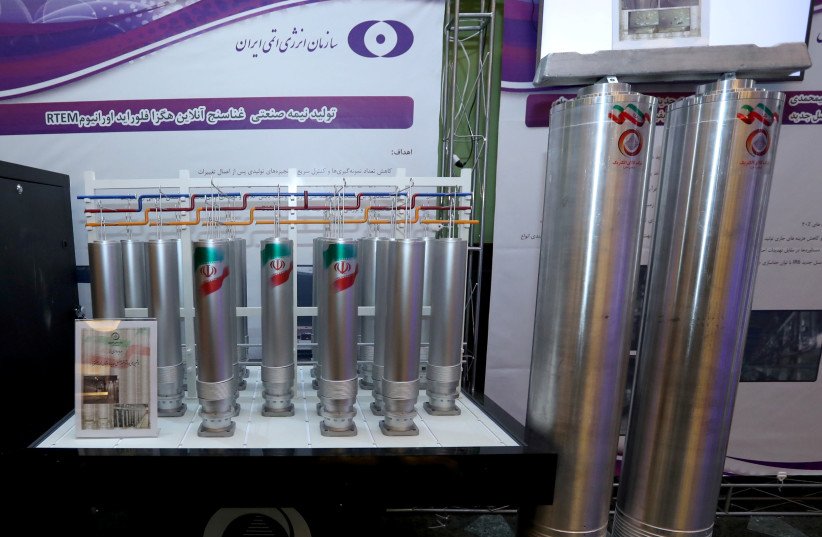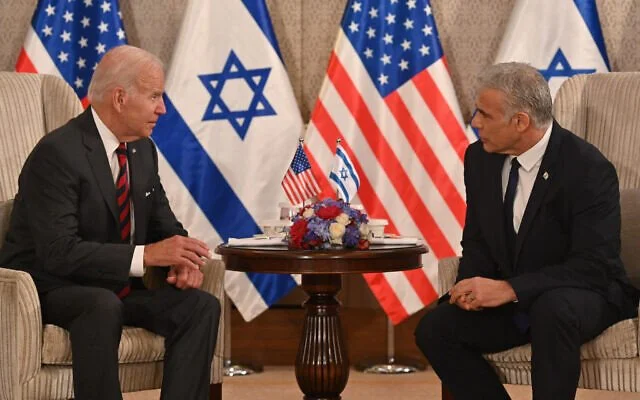Israel’s Efforts to Influence Negotiations on the Iran Nuclear Deal Reflect a Longer History of Opposition
Iranian centrifuges on display during National Nuclear Energy Day in Tehran. Photo: Iranian Presidency Office via Reuters
As the Biden administration leads efforts to revive the Joint Comprehensive Plan of Action (JCPOA), Israeli officials have once again expressed their concern that the deal will not be enough to halt Iran’s nuclear development.
After President Trump pulled out of the deal in 2018, negotiations between US, Iranian, and European officials have consistently reached an impasse, rendering a deal unlikely in the near future.
Although not an official member of the most recent talks in Vienna, Israel recently rejected a renewal of the original JCPOA - signed in 2015 - and instead argued that a nuclear deal with Iran must be tougher.
The previous agreement outlined in 2015 required Tehran to terminate much of its nuclear program and subject its facilities to international oversight. In return, the U.S agreed to relieve severe sanctions crippling the Iranian economy.
The breakdown of the most recent round of negotiations to reestablish the deal escalated when Israeli defense minister Benny Gantz highlighted that Iran would be capable of producing enriched uranium for three warheads in a matter of weeks. He also revealed Israeli intelligence showing 10 facilities in Syria being used to arm Iran and its proxy groups in the Middle East.
Israeli officials across the political spectrum have historically opposed the JCPOA, arguing that it did not go far enough to permanently end Iran’s nuclear program and allows Tehran to continue funding terrorist groups in the region that pose a direct threat to Israel.
According to Israeli intelligence corroborated by the International Atomic Energy Agency (IAEA), Iran continues to take significant strides in developing its nuclear program since the U.S exited the agreement in 2018. Even if the JCPOA was restored, Israel contends that the plan’s sunset provisions in 2030 would permit Iran to continue uranium enrichment. Furthermore, Israel is concerned that lifting Western sanctions on Iran emboldens terrorist activity in the region from groups like Hezbollah, an Iranian-backed militia group in Lebanon that opposes the state of Israel.
President Biden and Israeli Prime Minister Yair Lapid meet in Jerusalem in July 2022. Photo: Kobi Gideon/GPO
When the deal was originally brokered in 2015, former Israeli Prime Minister Benjamin Netanyahu, addressed the US Congress in an attempt to dissuade the US from entering the JCPOA.
In his speech he emphasized the shortcomings of the agreement, “The first major concession would leave Iran with a vast nuclear infrastructure, providing it with a short breakout time to the bomb.” He also asserted that Iran could not be trusted to adhere to restrictions on its nuclear program or international inspections in its facilities. The American Israel Public Affairs Committee (AIPAC), a prominent pro-Israel lobby, spent nearly $30 million in lobbying efforts to influence US officials not to support the agreement.
Negotiations to reenter the JCPOA have exacerbated international tensions, as well as debate within Israel regarding current Prime Minister Yair Lapid’s strategy to influence Western leaders. Netanyahu has criticized the current administration’s approach despite a wave of statements, diplomatic visits, and efforts to derail a return to the original agreement.
Lapid has been forthright in his administration’s opposition, stating, “Israel is conducting a successful diplomatic campaign to stop the nuclear agreement and prevent the lifting of sanctions on Iran.” In contrast to Netanyahu’s efforts, Lapid has focused on closed-door sessions with US officials “anchored in facts and intelligence.”
In September, Lapid and Gantz traveled to Germany and the US to express concerns about the 2015 agreement. During his visit to Berlin, Lapid noted that he has provided German Chancellor Olaf Scholz with intelligence on Iran’s nuclear ambitions and warned that reviving the deal could provoke a nuclear arms race in the Middle East and will increase terrorist attacks in the region. Instead, senior Israeli officials including Lapid argue that a better deal could be achieved if a military option is put on the table. Israel has made clear that it has the capacity to dismantle Tehran’s nuclear program if necessary.
The prospect of a revived agreement hinges on resolving two key issues. Tehran demands that the IAEA officially close its probe into its nuclear facilities, and, if the deal is restored, a stronger guarantee that it will benefit economically.
The US has fully rejected these concessions, resulting in praise from Israeli officials. With pressure from Israel to conduct stricter negotiations and assurances that it will use military means if necessary, it seems unlikely that these disagreements will be settled.


